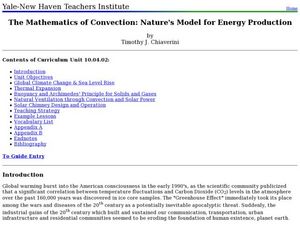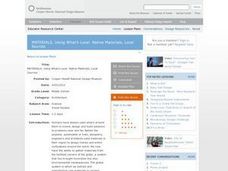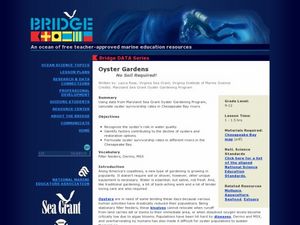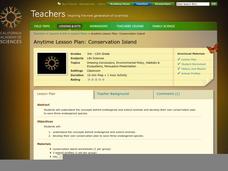Curated OER
The Airplane
Students demonstrate the Bernoulli Principle, review the influences that affected the Wright Brothers, and make and modify paper airplanes. This amazing lesson plan has an excellent structure, and very clear plans for the students to...
Curated OER
A Walk on the West Side
Students comprehend what makes up the physical community. Read and construct scale drawings and models. Explore the history of infrastructures and how the contributions of science, math and industry have led to the development of their...
Curated OER
Designing a Real Life Ecosystem!
Students research abiotic and biotic factors concerning the concept of an ecosystem. Record and analyze data collected. Write a lab report in proper and scientific format with thinking and analytical skills. Work as a cooperative team.
Curated OER
The Mathematics of Convection: Nature's Model for Energy Production
High schoolers conduct a series of experiments to investigate density, buoyancy and climate. In this math lesson, pupils design and build a hot air balloon to demonstrate convection. They research and write a paper about solar chimneys.
Media Literacy
Good Versus Evil: Exploring Popular Children's Animation
Dora, Buzz Lightyear, Mufasa. Swiper, Dr. Porkchop, Scar. The six lessons in this unit packet focus on how good and evil, and violence, are portrayed in children's animation. The lessons encourage kids to consider how violence is...
Council for Economic Education
Federal Budget Lesson Plan and Fiscal Ship Student Game
The federal budget has never been so fun! Using an interactive game, high schoolers choose from a variety of policy options after identifying goals and try to balance these changes in policy with a federal budget.
Curated OER
Pond Ecology
A lab activity is a great way to incite thoughtful questioning and scientific processes. Pupils will collect organisms with a Petri dish, make observations, sketch the organism, ask questions, then attempt to identify the specimen...
Curated OER
Fueling Extreme Weather
First graders identify the different stages in the hydrologic cycle. To study earth science, they investigate how sunlight affects the earth's temperature. They also discuss how the sun's energy is transformed.
Curated OER
Relationships, Day 4: Friendships & Dating
It is so important to help special needs individuals know the difference between dating and friendship. They define friendship, differentiate between friends and strangers, role-play, practice greetings, then talk about dating. This...
Curated OER
Bioethics and Effective Health Care
High Schoolers participate in a class discussion on the ethical issues faced in the health care industry today. In groups, they develop their own definition of bioethics and role play the role of one of the various types of members of...
Curated OER
Environmental Agents of Mathematics: Mathematics for Change
High schoolers analyze environmental science data using Math. They do research about renewable energy, gather data, create graphs and interpret their findings. Then the group presents their arguments persuasively using their findings to...
Wild BC
Bearly Any Ice
After reviewing food chains, your class members participate in an arctic predator-prey game that exemplifies the impact of climate change of food availability. If you are in a hurry, skip this lesson, but if you have the time to...
Out-of-School Time Resource Center
Nutrition and Physical Activity
Emerging nutritionists explore what it means to be healthy. In the beginning of the unit, your class will examine the five food groups and learn how food gets from the farm to our plates. This leads into the investigation of...
Curated OER
Solid Waste
Learners determine the percentage increase in output of solid waste in the U.S. They determine the length of time it takes for throw away items to decompose.
Curated OER
The War in the North, 1775-1778
Students investigate the hardships and difficulties that the Continental army faced in the early years of the American War for independence. the battles of Lexington and concord and the expectations of the Continental Army forms the...
Curated OER
Rainforest Complexity and Diversity
Second graders investigate the diversity of plants and animals in a rainforest. They watch an online story developed by the Rainforest Alliance, observe and record animals in their local area, explore various websites, and compare and...
Curated OER
How Smart Growth Can Reshape Communities
Middle schoolers explore the concept of smart growth development. They create a class list highlighting the benefits of smart growth and then research, discuss, and present their findings on the benefits of smart growth and how it...
Curated OER
MATERIALS, Using What’s Local: Native Materials, Local Sources
Middle schoolers consider the development of different societies. In this environmental building lesson, students consider local resources and how societies choose to use them. Middle schoolers use their findings to design a 'green'...
Council for Economic Education
China - Where Will They Fit in the World Economy?
Teach scholars why China is so crucial to global economics through an informative resource. Activities include using databases to search for information, watching a video or listening to a podcast, and reading about China's economy as a...
Curated OER
Oyster Gardens - No Soil Required!
Explore the practice of oyster gardening. Because oysters play a vital role in marine ecosystems and their populations have declined, biologists are transplanting oyster seed to repopulate reefs. After learning about this practice,...
Curated OER
Tomato Exploration
Create tomatoes in 15-20 minutes using this fun and interactive lesson plan! Learners listen to a book about tomatoes (recommendations listed), and focus on the vocabulary word tomato. They count the syllables...
Wild BC
Is Climate Change Good for Us?
Is it really that big of a deal if the global climate undergoes a little change? Young environmentalists consider this very question as they discuss in small groups the impact of different climate change scenarios on their lives,...
American Farm Bureau Foundation for Agriculture
Welcome to My American Farm!
Take a step into the virtual farm world and explore the impact farming has on our everyday eating habits. Future farmers discover the meaning of agriculture and the hard work that goes into providing food for us to enjoy. A computer...
California Academy of Science
Conservation Island
Why not walk in the footsteps of Teddy Roosevelt and become a conservationist? After discussing issues and reasons for animal extinction, the class creates their own conservation plans. Each small group is given mock data regarding a...

























